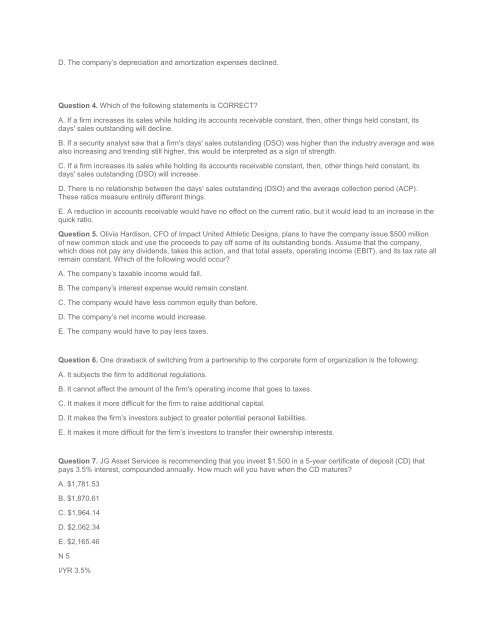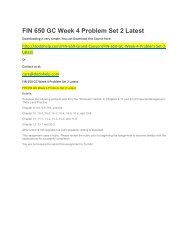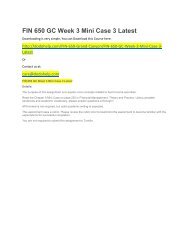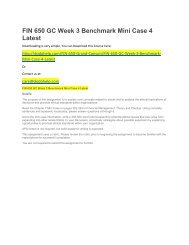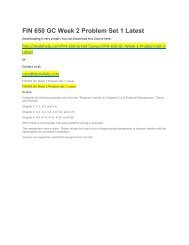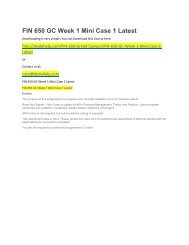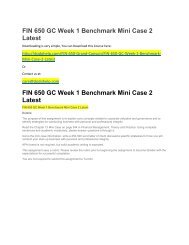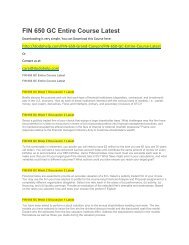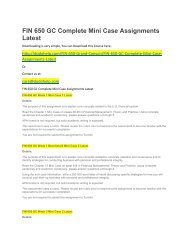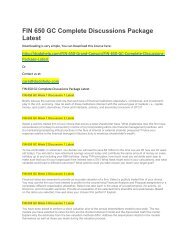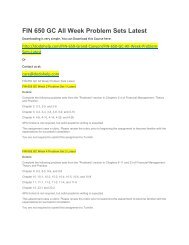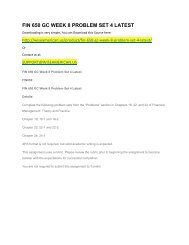FIN 650 GC Module 3 Exam Latest
Create successful ePaper yourself
Turn your PDF publications into a flip-book with our unique Google optimized e-Paper software.
D. The company’s depreciation and amortization expenses declined.<br />
Question 4. Which of the following statements is CORRECT?<br />
A. If a firm increases its sales while holding its accounts receivable constant, then, other things held constant, its<br />
days' sales outstanding will decline.<br />
B. If a security analyst saw that a firm's days' sales outstanding (DSO) was higher than the industry average and was<br />
also increasing and trending still higher, this would be interpreted as a sign of strength.<br />
C. If a firm increases its sales while holding its accounts receivable constant, then, other things held constant, its<br />
days' sales outstanding (DSO) will increase.<br />
D. There is no relationship between the days' sales outstanding (DSO) and the average collection period (ACP).<br />
These ratios measure entirely different things.<br />
E. A reduction in accounts receivable would have no effect on the current ratio, but it would lead to an increase in the<br />
quick ratio.<br />
Question 5. Olivia Hardison, CFO of Impact United Athletic Designs, plans to have the company issue $500 million<br />
of new common stock and use the proceeds to pay off some of its outstanding bonds. Assume that the company,<br />
which does not pay any dividends, takes this action, and that total assets, operating income (EBIT), and its tax rate all<br />
remain constant. Which of the following would occur?<br />
A. The company’s taxable income would fall.<br />
B. The company’s interest expense would remain constant.<br />
C. The company would have less common equity than before.<br />
D. The company’s net income would increase.<br />
E. The company would have to pay less taxes.<br />
Question 6. One drawback of switching from a partnership to the corporate form of organization is the following:<br />
A. It subjects the firm to additional regulations.<br />
B. It cannot affect the amount of the firm's operating income that goes to taxes.<br />
C. It makes it more difficult for the firm to raise additional capital.<br />
D. It makes the firm’s investors subject to greater potential personal liabilities.<br />
E. It makes it more difficult for the firm’s investors to transfer their ownership interests.<br />
Question 7. JG Asset Services is recommending that you invest $1,500 in a 5-year certificate of deposit (CD) that<br />
pays 3.5% interest, compounded annually. How much will you have when the CD matures?<br />
A. $1,781.53<br />
B. $1,870.61<br />
C. $1,964.14<br />
D. $2,062.34<br />
E. $2,165.46<br />
N 5<br />
I/YR 3.5%


